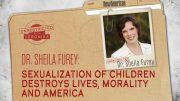
“Increasingly, some educators and other professionals who work with children are asking a question that might surprise their parents: Should a child really have a best friend?” Such is the latest worry according to a recent story by Hilary Stout in the New York Times.
Whoever would have imagined that all the effort by child psychologists and behaviorist educators over the past 40 years to replace the school’s former academic focus with the goal of socialization would now be headed for the ashbin of history — along with the dress codes, good manners and “Yes, Ma’ams” and “Yes, Sirs” they once loudly decried? Maybe all that socializing was too much of a good thing. The same field of incompetents who diagnose questionable brain diseases in every other child, correct learning and behavioral “disorders” with psychotropic drugs, and call for “teamwork” over individual excellence is anxious about “bullying” and “cliques.”
Precisely what they thought they were going to get once children became the authority figures and adults were relegated to stepping, fetching, chauffeuring, and arranging “play dates” (which “usually have to be planned a week or more in advance,” according to the article) is unclear. What they got, of course, was a Lord of the Flies subculture along the lines described in William Golding’s famous, allegorical novel. But today’s subculture doesn’t affect just a small group of stranded British boys, as per the 1954 novel. Instead, this subculture morphed until, by the 1990s, it had permeated American society and much of the rest of the free world. In the United States, the Lord of the Flies mentality has spawned such toxic schools that little “educating” can any longer take place.
Pseudo-educators-turned-social engineers, like John Dewey in the 1920s, were among the first in a long list to dismiss the three R’s as being vastly overrated and to favor child-socialization instead. But the anti-discipline, anti-authoritarian factions began launching a more aggressive campaign under the umbrella of “Mental Hygiene” immediately following World War II. Through speeches, women’s magazines, and teacher-preparation courses, psychologists and psychiatrists started pitching the idea that unless parents wanted to turn out a bunch of little Hitlers and Mussolinis, they had better ease up on the discipline and drop their obsession with right and wrong. Canadian psychologist, Dr. Brock Chisholm, argued in a 1946 speech to the World Federation of Mental Health that right-versus-wrong, and morality itself, were “perversions” that needed to be “redefined” and eventually “eradicated.” He insisted that childrearing methods were “turning out a thousand neurotics for every one that psychiatrist can hope to cure with psycho-therapy.”
Chisholm had plenty of company in the so-called Progressive Movement of new educators. By 1970, one could hardly find a teaching curriculum in any university that wasn’t almost totally immersed in psychology. The left-wing took it all a step further with a political spin toward socialism. In a now-declassified book, Social Psychology and Propaganda, published by the Institute of Social Sciences, (Progress Publishers, Moscow, 1985), future educators learned that “socio-psychological knowledge plays a great role … in “tasks that include the perfection of the socialist way of life and combating such antipodes … as individualism.”
Gradually, the suggestion that children learn to question, and even disobey, their parents gained a foothold in professional circles, and was picked up by a public which found the “package” suddenly attractive after the atrocities uncovered at Auschwitz, Belsen, Treblinka, and the Bataan Death March. Parents of that generation were ready to give their offspring a “real childhood” they themselves felt they had been denied during the war years.
The notion that parents and teachers should be the child’s buddy and that youngsters could be “instrumental in their own decision-making” started taking a grotesque turn in the mid-1970s. Still, child “experts” didn’t back off. Instead, they pushed little children to invent their own values, and chastised parents for “pushing their values onto their children.” Today, trends like home schooling are derided as child abuse — because of a supposed lack of socialization opportunities.
Now, to read the New York Times article, it appears that it is too much, not too little, socialization that is cause for angst, while parents busily micromanage their kids’ lives instead of allowing them to just go out and play.
“The days when children roamed the neighborhood and played with whomever they wanted to until the streetlights came on disappeared long ago, replaced by the scheduled play date,” lamented the Times article. “While in the past a social slight in backyard games rarely came to teachers’ attention …, today an upsetting text message from one middle school student to another is often forwarded to school administrators, who frequently feel compelled to intervene.”
Why? To head off bullying.
So, what’s different about bullying? Weren’t there bullies in the 1940s? Yes, but the bullying of today is of a type that would have sent shock waves through families of the 1930s, 40s, and 50s. Today it’s vicious, Lord-of-the-Flies behavior.
What, then, do we have to show for the diktats of child experts?
First, an entire education system based in the abandonment of moral absolutes. Schools grounded in moral relativism are passing along the notion that there are no standards or principles of behavior that cannot be bent or broken, only petty “gotcha”-type rules of political correctness infamy are inviolable. From the moment a child steps on the school bus (parents taking their children to school is discouraged), the student is jockeying for popularity points with peers. Primping and grandstanding dominate the pupil’s entire school day, mushrooming into brutal popularity contests and school violence.
Intransigent peer pressure trumps teacher authority, leading to a lack of respect for school and for learning. It is hard for schools to get, much less keep, good teachers in such a climate. This creates a vicious cycle of continuous parent-teacher-administrator confrontations. Parental interest, patience, and support for schools and their teachers eventually wears thin, sending mixed messages to kids.
The result: School is now mostly a political football for leftist opportunists, and a black hole for taxpayers. Delinquency, cynicism, unemployability, alienation: These are the fruits of child experts’ “socialization” gambit, and it is leading us all unknowing to a different sort of national security crisis that, in the end, will “require” imposition of a police-state.
That will suit the 21st Century breed of socialists in government just fine.
_____________
Beverly K. Eakman is a former educator and retired federal employee who served as speechwriter for the heads of three government agencies as well as editor-in-chief of NASA’s newspaper (Johnson Space Center). Today, she is a Washington, D.C.-based freelance writer and columnist, the author of five books, and a frequent keynote speaker on the lecture circuit. Her most recent book is Walking Targets: How Our Psychologized Classrooms Are Producing a Nation of Sitting Ducks (Midnight Whistler Publishers).



